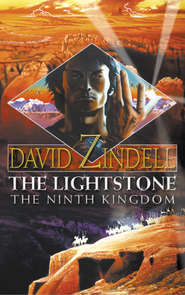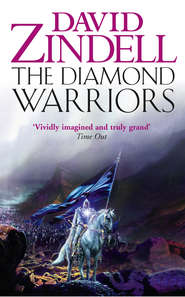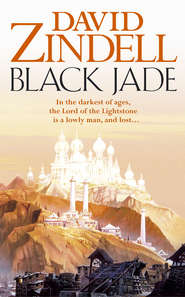По всем вопросам обращайтесь на: info@litportal.ru
(©) 2003-2024.
✖
Neverness
Настройки чтения
Размер шрифта
Высота строк
Поля
Beneath the silk of my robe, I felt hot sweat running down my sides in rivulets as I asked, ‘You would do that, Lord Pilot?’
‘Who knows? Who knows his fate?’ He turned to Katharine and asked, ‘Have you seen his future? What will be done with Mallory? Should he be kept from his fate? “To die among the stars is the most glorious death” – that’s what the Tycho said before he disappeared into the Solid State Entity. Maybe Mallory will succeed where our greatest pilot failed. Should he be kept from fate and glory? Tell me, my lovely scryer.’
Everyone looked at Katharine as she stood there calmly listening to Soli. She must have sensed their stares because she put her hand into the side pocket of her robe, ‘the pocket of concealment,’ where the scryers keep their tub of blacking oil. When she removed her hand, her forefinger was covered with a cream so black that it shed no light; it was as if she had no finger, as if a miniature black hole existed in the space that her finger occupied. According to the custom of the scryers she daubed the oil into the hollows of her eyepits, coating the scars with concealing blackness. I looked at the hollows above her high cheekbones; it was like looking down two dark, mysterious tunnels into her soul where windows should have been. I looked at her for only a moment before I had to look away.
I was about to tell my sarcastic, arrogant uncle that I would do as I had sworn no matter what he decided when Katharine let out a clear, girlish laugh and said, ‘Mallory’s fate is his fate, and nothing can change … Except, Father, that you have changed it and always will have …’ And here she laughed again, and continued, ‘But in the end we choose our futures, do you see?’
Soli did not see, and neither did I nor anyone else. Who could understand the paradoxical, irritating sayings of the scryers?
Just then Bardo ambled over and thumped me on the back. He bowed to Justine and smiled before quickly looking away. Bardo – he had always tried to keep it a secret, but he could not – lusted for my aunt. I did not think that she lusted for him, nor did she quite approve of his brazen sexuality, though in truth, they were alike in one certain way: They both loved physical pleasure, and cared little for the past, nothing at all for the future. After being introduced to Katharine, he bowed to Soli and said, ‘Lord Pilot, has Mallory apologized for his barbaric behaviour last night? No? Well, I’ll apologize for him because he’s much too proud to apologize, and only I know how sorry he really is.’
‘Pride kills,’ Soli said.
‘“Pride kills,”’ Bardo repeated as he smoothed his black moustache with the side of his thumb. ‘Of course it does! But where does Mallory get his pride from? I’ve been his roommate for twelve years, and I know. “Soli is mapping the core stars,” he used to say. “Soli almost proved the Great Theorem.” Soli this, and Soli that – do you know what he says when I tell him he’s insane for wasting time practising his speed strokes? He says, “When Soli became a pilot, he won the pilot’s race, and so shall I.”’
He was referring, of course, to the race between the new pilots and the older ones held every year just after the convocation. For many, it is the high point of the Tycho’s Festival.
I was sure that my face was red. I could hardly bear to look at my uncle as he said, ‘Then tomorrow’s race should be challenging. No one has beaten me for …’ His eyes suddenly clouded, and his voice trembled, slightly, and he continued, ‘for a long time.’
We spent a short while debating the aerodynamics of racing. I held that a low tuck was more efficient, but Soli pointed out that in a long race – as tomorrow’s race would be – a low tuck quickly burned out the muscles of the thigh, and that one must practise restraint.
Our conversation was cut short when ten red-robed horologes marched out on to the dais and took their places by the Timekeeper, five to either side. In unison they sang out, ‘Silence, it is time! Silence, it is time!’ and there was a sudden silence in the Hall. Then the Timekeeper stepped forward, and he announced his summons and called the quest for the Elder Eddas. ‘The secret of Man’s immortality,’ he told us, ‘lies in our past and in our future.’ I felt Katharine’s shoulder brush my own, and I was shocked (and excited) to feel her long fingers quickly and secretly squeeze my hand. I listened to the Timekeeper repeat the message that Soli had brought back from the core; I listened and for a moment I was enraptured with dreams of discovering great things. Then I happened to look at Soli’s brooding eyes, and I did not care if I did great things. In my single-minded way I cared about only a single thing: that I should beat Soli in the pilot’s race. ‘We must search for the mystery,’ the Timekeeper continued. ‘If we search, we will discover the secret of life and save ourselves.’ At that moment I did not care about secrets or salvation. What I wanted, simply, was to defeat a proud, arrogant man.
I had resolved to return to my room and to sleep until the sun was high above the slopes of Urkel, but I had not counted on the excitement that the Timekeeper’s summons would arouse. The halls of our dormitory – and indeed, all of Resa – rang from the happy cries and shouts of pilots and journeymen and masters. Against my wishes, our rooms became a nexus for the night’s celebrations. Chantal Astoreth and Delora wi Towt arrived with three of their neologician friends from Lara Sig. Bardo distributed pipefuls of toalache, and the revelry began. It was a wild, magic night; it was a night of tremulously announced plans to reach Old Earth or to map the Tycho’s nebula, to fulfil our vow to seek wisdom as befitted our individual talents and dreams. Soon our two adjoining rooms were thick with blue smoke and carpeted from wall to wall with excited pilots and various other professionals who had heard about the party. Li Tosh, who was a gentle man with bright, quick almond eyes, announced his plan to reach the homeworld of the trickster aliens, the Darghinni. ‘It’s said that they’ve studied the history of the nebular brains,’ he told us. ‘Perhaps when I return, I’ll have enough courage to penetrate the Entity, too.’ Hideki Smith would sculpt his body into the weird, cruel shape of the Fayoli; he would journey to one of their planets and try to pose as one of them in hope of learning their secrets. Not to be outdone, red-haired Quirin proposed to journey to Agathange, where he would ask the porpoise-like men – who had long ago broken the law of the Civilized Worlds and had carked their DNA so that they were now more than men – he would ask the wise Agathanians about the secret of human life. I must admit that there were many sceptics such as Bardo who did not believe that the Ieldra possessed any great secret. But even the most sceptical of these pilots – Richardess and the Sonderval came immediately to mind – were eager to be off into the manifold. To them the quest was a wonderful excuse to seek fame and glory.
Around midnight my cousin Katharine appeared in our outer room’s open doorway. How she had found her way blind and alone across the confusing streets of the Academy she would not say. She sat next to me cross-legged on the floor. She flirted with me in her secretive, scryer’s way. I was intrigued that an older, wiser woman paid me such attention, and I think she must have realized that I found her tantalizing. I told myself that she, too, was a little in love with me, although I knew that scryers often act not to satisfy their passions but to fulfil some tenuous and private vision. In many barbaric places, of course, where the art of genotyping is primitive, cousin marriage (and mating) is forbidden. One never knows what sort of monsters the mingling of the germ plasm will produce. But Neverness was not one of those places. That we were so closely related seemed only slightly incestuous and very exciting.
We talked about what she had said earlier to Soli about fate, in particular about my fate. She laughed at me as she stripped the black leather glove from my right hand. She slowly stroked the lines of my naked palm and foresaw that the span of my years would be ‘measureless to man.’ I thought that she had a keen sense of humour. When I asked if her words meant that my life would be very long or absurdly short, she turned to me with that beautiful, mysterious smile the scryers affect, and she said, ‘A moment to a photino is infinite, and to a god, our universe has lived but a moment. You must learn to love the moments you have, Mallory.’ (Towards the early part of morning, she taught me that moments of sexual ecstasy and love can indeed be made to last nearly forever. At the time I did not know whether to ascribe this miracle to the time-annihilating training of the scryers, or if all women had such power.)
It was a night of sorrowful goodbyes, as well. At one point Bardo, his weepy eyes electric with toalache, pulled me away from Katharine and said, ‘You’re the finest friend I’ve ever had. The finest friend anyone has ever had. And now Bardo must lose you because of a stupid oath. It’s not fair! Why is this cold, empty universe, which has bestowed upon us what we so laughingly call life, why is it so barbarically unfair? I, Bardo, will shout it across the room, shout it to the Rosette Nebula and to Eta Carina and to Regal Luz: It’s unfair! Unfair it is, and that’s why we were given brains, to cozen and plan, to circumvent and cheat. It’s to cheat death that I’m going to tell you what I’ll tell you. You won’t like this, my brave, noble friend, but here it is: You’ve got to let Soli win the race tomorrow. He’s like my father, he’s proud and vain, and he hates for anyone to beat him. I’m a keen judge of character, and I know. Let him win the race and he’ll let you take back your oath. Please, Mallory, as you love me, let him win the stupid race!’
Late the next morning, I pulled on my racing kamelaika and met my mother for breakfast at one of the cafes that line the Run opposite the flowing Hyacinth Gardens. ‘You’re racing Soli today, and you didn’t sleep last night, did you? Here, drink this coffee. It’s Farfara prime. I’ve taught you strategy since you were four years old, and you didn’t sleep last night?’
‘Bardo thinks I should let Soli win the race.’
‘He’s a fat fool. Haven’t I told you that for twelve years? He thinks he’s clever. Clever he’s not. I could have taught him cleverness. When I was four years old.’
From a delicate blue pot, she poured coffee into a marble cup and slid it across the table. I sipped the hot, black coffee, totally unprepared for what she said next. ‘We can leave the Order,’ she whispered, tilting her head as she quickly glanced at the two master mechanics sitting at the table next to us. ‘The new academy, the one on Tria, you know what I’m saying, don’t you? They need pilots, good ones like you. Why should our Order tyrannize the fallaways?’
I was so shocked that I spilled coffee on my lap, burning my leg. The Merchant Pilots of Tria – those wily, unethical thingists and tubists – for a long time had tried to break the power of our Order. ‘What are you saying, Mother? That we should be traitors?’
‘Traitors to the Order, yes. Better for you to betray a few hastily given vows, than to betray the life I gave you.’
‘You always hoped I’d be Lord Pilot someday.’
‘You could be a merchant prince. Of Tria.’
‘No, Mother, never that.’
‘It would surprise you. That certain pilots have been offered middle estates on Tria. Certain programmers and cantors, too.’
‘But no one has accepted, have they?’
‘Not yet,’ she said, and she began drumming her fingers against the table top. ‘But there is more dissension among the professionals than you know. Some of the historians like Burgos Harsha think the Order is stagnating. And the pilots. The rule against marriage is almost as hated as marriage is hateful.’ Here she paused to laugh at her little joke, then continued, ‘There is more disorder in the Order than you’d dream.’ She laughed again as if she knew something I didn’t, and she sat back in her chair, waiting.
‘I’d rather die than go to Tria.’
‘Then we’ll flee to Lechoix. Your grandmother will welcome us, even if you are a bull.’
‘I don’t think she will.’
My grandmother whom I had never met, Dama Oriana Ringess, had brought up Justine and my mother – and Katharine – properly. ‘Properly’ in the Lechoix Matriarchy meant an early introduction into the feminine mysteries and severe language rules. Thus men are despised and are referred to as ‘bulls,’ or ‘gamecocks,’ or sometimes ‘mules.’ Desire between man and woman is called ‘the sick heat,’ and marriage, heterosexual marriage, that is, is ‘the living hell.’ The High Damen, of which my grandmother is one of the highest, abhorring the belief that men make better pilots than women, support the largest and best of the Order’s elite schools. So it was that when my mother and Justine arrived at Borja long ago having never seen a man, they were shocked – and in my mother’s case, hateful – that such young beasts as Lionel and Soli could be better mathematicians than they were.
‘Dama Oriana,’ I said, ‘would do nothing that would shame the Matriarchy, would she?’
‘Listen to me. Listen! I won’t let Soli kill my son!’ She said the word ‘son’ with such a wrenching desperation that I felt compelled to look at her, even as she burst into tears and sobbed. She nervously pulled her hair from the chignon’s binding leather and used the shiny strands to dry her face. ‘Listen, listen,’ she said. ‘Brilliant Soli returns from the manifold. Brilliant as always, but not so brilliant. I used to beat him. At chess. Three games out of four before he quit playing me.’
‘What do you mean?’
‘I’ve ordered you bread,’ she said as she held up her hand and motioned to the domestic. It rolled to the table where it placed before me a basket of hot, crusty black bread. ‘Eat your bread and drink your coffee.’
‘You’re not eating?’
Usually she had bread at breakfast; like her sisters on Lechoix she would eat no foods of animal origin, not even the cultured meats favoured by almost everyone in our city.
I reached for one of the small, oblong loaves. I bit into it; it was delicious. As I chewed the hard bread, she removed a ball of chocolate from the blue bowl in front of her and popped it into her mouth.
‘What if I succeed, Mother?’ I asked. She stuffed three more balls of chocolate into her mouth, staring at me.
Her reply was barely comprehensible, a burble of words forced through a mouthful of sticky, melting chocolate: ‘Sometimes I think Soli’s right. My son is a fool.’
‘You’ve always said you have faith in me.’
‘Faith I have; blind faith I have not.’
‘Why should it be impossible? The Entity is a nebula much like any other: hot gases, interstellar dust, a few million stars. Perhaps it’s mere chance that the Tycho and the others were lost.’
‘Heresy!’ she said as she picked apart a chocolate ball with her long fingernails. ‘Haven’t I taught you better? I won’t have you saying that word. It’s not chance. That killed the Tycho. It’s She.’
‘She?’
‘The Entity. She’s a web of a million meshing biocomputers the size of moons. She manipulates matter. And She plies energy. And She twists space to Her liking. The manifold inside Her is known to be strange, hideously complex.’
‘Why do you call her “She”?’
My mother smiled and said, ‘Should I call the greatest intelligence, the holiest life in our universe, “he”?’
‘What of the Silicon God, then?’











